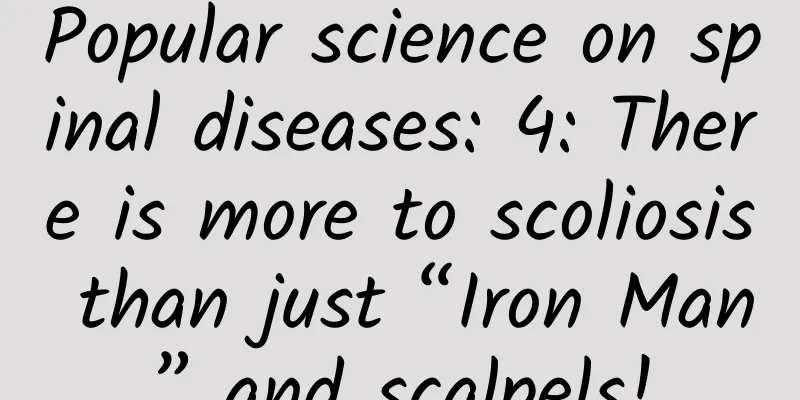Popular science on spinal diseases: 4: There is more to scoliosis than just “Iron Man” and scalpels!

|
When a child is diagnosed with scoliosis, parents often feel deeply anxious, worrying that their child's cardiopulmonary function will be affected, that their appearance will be ugly and they will be discriminated against, etc., so they put on bulky braces or perform surgery on their children early. But is this really the case? Let's find out! Myth: Scoliosis is not just about braces or surgery Scoliosis, a disease that sounds a bit "curved", is often mistakenly believed to be "straightened" only by braces or surgery. However, this concept ignores a key fact: early screening and diagnosis are the "golden key" to controlling scoliosis. How parents can easily screen for scoliosis As a parent, you can screen your child for signs of scoliosis by doing the following simple things: 1. Standing observation method: Have your child stand up straight with feet together and arms hanging freely. Look at your child's spine from behind to check for any asymmetries, such as one shoulder being noticeably higher than the other or one shoulder blade being more prominent than the other. 2. Forward bend test: Have your child stand with their feet together, then slowly bend forward and let their hands drop to the ground. As your child bends forward, observe the spine from behind to see if one side of the back is higher than the other. 3. Waistline check: Have your child stand up straight and look at the line of his or her waist from the side to see if there is any obvious asymmetry. If any abnormalities are found in these tests, it is recommended to take your child to the hospital for professional examination and diagnosis as soon as possible. Purpose of early screening: effectively opening the door to treatment Regular physical examinations are like the "guardian angel" of spinal health. They can help us detect scoliosis in time and take measures at an early stage to prevent it from "quietly getting worse." It is easier to detect scoliosis early through school physical examinations or simple examinations at home. Non-surgical treatment: gentle but effective For mild scoliosis (10°-20°), physical therapy and corrective exercises can be like a "gentle gardener" that can improve spinal symmetry and function through stretching, strengthening, and corrective breathing exercises. These exercises include: - Stretching exercises: Specific stretching exercises can relieve muscle tension and improve spinal flexibility. - Core muscle training: Strengthen the core muscles to provide better spinal support. - Postural correction exercises: Improve the symmetry and stability of the spine through specific posture training. Orthotics: More Than Just a Vest For scoliosis above 20°, the role of a brace cannot be underestimated. It is not just a vest, but also a "secret weapon" to control the curvature of the spine. The effect of the brace depends on the time and method of wearing it, and it is crucial to strictly follow the doctor's instructions. - Wearing time: You should wear your braces for the length of time recommended by your doctor, which is usually 16-23 hours a day. - How to wear: Wear the corrector correctly to ensure that it can effectively support and correct the spinal curvature. Conclusion: Don’t panic about scoliosis Scoliosis is not a diagnosis that should cause panic. Through early screening, physical therapy, brace wearing, and corrective surgery when necessary, we can effectively control and improve scoliosis. Remember, scientific methods are the key to solving the problem. Let us use scientific methods to break the rumors and embrace a healthier and more upright life! Author: Wang Jiaxu, Department of Spine Surgery, 9th Medical Center, PLA General Hospital Reviewer: Mu Xiaohong, Director of Orthopedics Department, Dongzhimen Hospital, Beijing University of Chinese Medicine, Vice Chairman of Bone and Joint Rehabilitation Committee of Chinese Rehabilitation Medicine Association Chen Jiang, Chief Physician of Orthopedics Department, Dongzhimen Hospital, Beijing University of Chinese Medicine, Member of Bone and Joint Rehabilitation Committee of Chinese Rehabilitation Medicine Association |
Recommend
Pain in the wound one year after cesarean section
Cesarean section is a common method of delivery i...
Why do cats still scratch after deworming? Can kittens be dewormed externally for 40 days?
When fleas appear on a cat, or the cat scratches ...
Six habits to improve your private health
A healthy and independent woman can attract the a...
What are the causes of vulvar and perianal itching?
If you have itching around the vulva and anus, yo...
Why did my second uncle become disabled after taking an injection? Many people had this injection when they were young.
A short video titled "After returning to the...
Ovulation suddenly delayed by 10 days
Women's bodies need an ovulation period every...
Postpartum bleeding in stool
Many pregnant women will inexplicably notice that...
Why does the goldfish flower have root rot? How to deal with the root rot of the goldfish flower
Goldfish flowers are a common flower in life. Man...
What to do if breast duct is blocked?
If women have blocked mammary ducts, milk will ac...
How often should I have a gynecological TCT examination?
Cervical cancer is still one of the most common g...
Eight symptoms of women indicating irregular menstruation
Irregular menstruation brings many harms to femal...
Can women take a bath during menstruation?
When it comes to menstruation, it will cause a lo...
What are the treatments for uterine displacement?
You may be unfamiliar with uterine displacement. ...
Dryness alert! How can the elderly avoid the spring "desert skin" dilemma?
Skin itching is one of the most common symptoms o...
What to do if couples have dry sex during menopause
The most specific manifestation of the arrival of...









